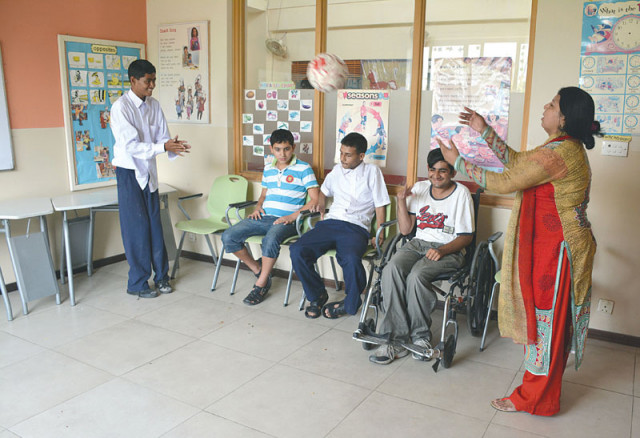A success story: For special needs children, a ray of hope
Charitable organisation extends helping hand to many special children.

The first word in the term ‘special children’ actually refers to the ‘special needs’ of a child, and not the person. Unfortunately, even though it is the second word of the second term that matters most — needs — it is the one usually glossed over.
Most people are familiar with the plight of Pakistani children, especially from lower-income backgrounds, but few realise that for special children, who are further ostracised simply for being different, life is even more difficult.

The centre is catered to children with intellectual disabilities including Down syndrome and autism, hearing impairments, and certain speech impediments. PHOTOS: HUMA CHOUDHARY
Limited capacity in government assistance programmes for special children mean that charitable organisations often need to fill the gap. In Islamabad, one such organisation is Umeed-e-Noor, which has been helping providing specialised, devoted speech therapists and physiotherapists to assist children with certain impairments.
Now situated in Sector H-8/1, the centre for special children was established in a house back in 1996 with limited space and a handful of students. However, with the effort and hard work out put in by the chairperson Noor Sultan and principal Gulnar Sultana, the school has come a long way.
From the early days collecting donations from philanthropists to laying the foundation of the new building, the duo has overcome many hurdles.
The tidy and colourful classrooms not only represent the effort put in by many, but also reflect the contribution Sultana has made for the success of her brainchild.

The centre is catered to children with intellectual disabilities including Down syndrome and autism, hearing impairments, and certain speech impediments. PHOTOS: HUMA CHOUDHARY
Sultana moved from Mardan to Islamabad back in 1996 and has since then spent all her time teaching and helping special needs children.
The principal shares how she had to battle on different ground to reach where she stands today. “Even my brother was against my move to Islamabad and coming home from work late,” she recalled, adding however that it was her father who constantly encouraged her and helped her grow.
Despite hailing from a conservative family, Sultana’s father let her work towards her passion, which eventually made the project possible.
The teachers use flash-cards and conduct activities using table tennis balls, colourful paintings and special speech and other sessions with regard to their level of disability. Each class consists of five to six children with a senior teacher and an assistant.

The centre is catered to children with intellectual disabilities including Down syndrome and autism, hearing impairments, and certain speech impediments. PHOTOS: HUMA CHOUDHARY
Individualised educational programmes coupled with motivational and physical strategies have been developed for each child.
The centre is catered to children with intellectual disabilities including Down syndrome and autism, hearing impairments, and certain speech impediments. So far over 1,800 children have benefitted from Umeed-e-Noor and there are plans in the pipeline to further extend the portfolio.
The centre also has a physiotherapy department, where two teachers assist children with mobility problems. “I am here since the school was established and am trying to play my role in helping these children,” remarked Ghafoor Ahmed, a therapist. Problems like muscle tone, strength, gross and fine motor skills, eye hand coordination are also addressed, Ahmed added.
Home
Seven students at the centre are in the boarding school.
Mafia, a 24-year-old boarder, is among them. She has microcephaly, a neurodevelopment disorder recognisable by the disproportionately small heads of those with the disorder.

She was admitted by her father in 1996, the same year the centre opened. In the 18 years since, no member of her family has paid her a visit.
Regarding the finances of the charitable organisation, its senior finance officer Muhammad Rahim Shah said they have been struggling to raise funds in the recent past as annual fundraisers have not been held for the last five years.
“People can get involved by sharing expertise and skills, funding programmes or projects, provision of equipment or the construction cost since we are planning on expanding,” Shah commented.
Speaking on the expansion plans, Sultana said that they are working towards building an audiology department to conduct hearing tests and a specialised speech therapy and a hydrotherapy department for children with disabilities who cannot be properly accommodated at present due to their absence.
Published in The Express Tribune, September 18th, 2014.



















COMMENTS
Comments are moderated and generally will be posted if they are on-topic and not abusive.
For more information, please see our Comments FAQ